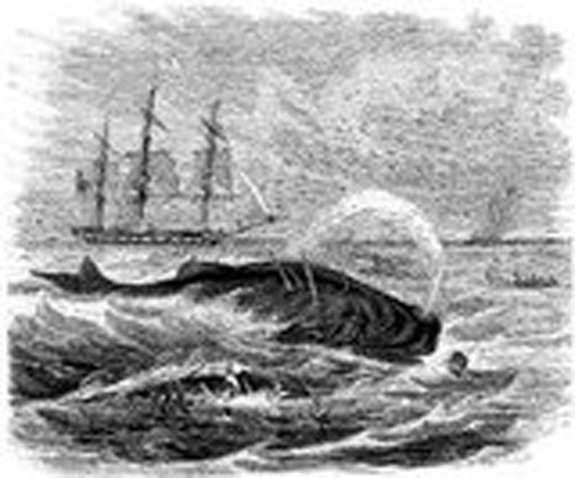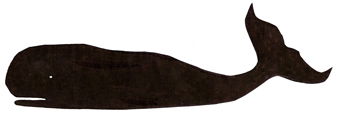Local New Bedford, Ma. History
1700 - 1749 In Chronological Order
|

Chasing Down a Sperm Whale
1700 - 1749 ushered in more changes to the village
|
| 1700's At this time the area was sparesely settled and there were large farms along the waterfront with the farmhouses built along the crest on County Road, which is now County St. |
| |
1703, February 16
At the town meeting it was voted that James Garner should not be the minister of the town. This action revealed the strained relations with the Established Church. |
| |
1704 - 1705
Education was considered at this early period.
Daniel Shepard was chosen schoolmaster and eighteen pounds and his debt was voted to him for his service for the year.
As part of the tax issue with penalties for non-compliance every "planter had to kill 12 blackbirds between January 1, and the middle of May.
It was also ordered that a law book for the town's use was to be bought and paid for out of the town's rates. |
| |
1709
It was agreed with Henry Howland "to make a pair of stocks and a whipping post." |
| |
1709
John Tucker Sr., William Wood, William Soule, John Lapham Jr., Deliverance Smith and Nathaniel Howland, members of the Dartmouth Monthly Meeting (Quakers) were impressed for military service in Canada.
They refused to serve and were taken before Governor Dudley at Roxbury who gave them a hearing and discharge. |
| |
1711
Nicholas Lapham and John Tucker Jr., Quakers, for refusing to render military service were imprisoned for four weeks and two days in the "Castle" in Boston. |
| |
1713
Wild animals were a problem and in that year it was agreed "that twenty shillings shall be added to each person that shall kill a wolf within the township of Dartmouth." |
| |
1715
A new law was passed entitled " An Act For Maintaining and Propagating religion".
It said "the prevention of the growth of Atheism, Irreligion and Profaneness is suggested as one great reason of its being enacted; and the power of determining who shall be ministers under the aforesaid qualifications is by the said law assumed by the General Court of Assembly, with the recommendation of any three of the ministers of the same sect, already in orders, and settled and supported by virtue of said laws....etc. |
| |
1716
The Friends (Quakers) gave testimony at the quarterly meeting against slavery in the following action:
"The matter relating to the purchasing of slaves being agitated in the meeting, it is concluded by ye most of ye meeting that it would be most agreeable to our holy profession to forbear for time to come, to be in any way concerned in purchasing any slaves."
In the following years New Bedford established itself as a refuge for runaway slaves. Many found refuge in the homes of Quakers and by their safe guidance were sent by the underground railroad to freedom. |
| |
1718
"A law was made to compel all the country to assist in building or repairing Congregational Meeting houses.
Tiverton and Dartmouth were the only remaining towns in the province which had not received any Congregational ministers.
Therefore, a complaint was made against them to the legislature in May 1722 and they voted a salary for such ministers with a to be assessed against all the inhabitants of said towns, which the ministers were to draw out of the state treasury, but the assessors sent and obtained an account of how much was added to their tax on that account and then left it out of their assessment.
For this two assessors of each town were seized in May of 1723 and imprisoned in Bristol until they sent to England and got the act disannulled by the King and Council.
One of those sufferers was Phillip Taber, Pastor of the Baptist Church, on the borders of Tiverton and Dartmouth.
But before the order two more assessors of Dartmouth were put in prison for not assessing a like tax imposed in 1723. (From Rickettson quoting from "Backus' Church History of New England"). |
| |
1721
It was voted that "all geese running at large from the 1st day of April to the last day of October without their wings cut and without a yoke upon them shall be placed in the town pound, and the owner of said geese shall pay one penny a piece for the pounding of the same." |
| |
1722
The town voted that three shillings be allowed for any wild cat that shall be killed within out township from the last day of September to the first day of March. and six shillings for any killed in the other part of the year." |
| |
1723
John Akin and Phillip Tabor, of Dartmouth, Joseph Anthony and John Sisson of Tiverton were assessors to their respective towns; and being Quakers and Baptists they refused to collect taxes imposed by the General Court Of Massachusetts for the maintenance of ministers.
This order was from the general court in Boston who had authority as of the 1692 charter.
For this they were all imprisoned at the common jail at new Bristol.
The case was successfully argued before the King's Privy Council and it was decreed that not only must the officials be released but also that the taxes must be remitted.
This was a very important step for the Quakers because it marked the end of the persecution that had followed them for so long. |
| |
1724
Peleg Slocum and John Tucker , members of the Dartmouth Monthly Meeting of Friends, refused to pay a tax for building a Presbyterian Church at Chilmark.
Their property on the Elizabeth Islands was seized, and a horse and a heifer and 80 sheep were sold to pay the rates. |
| |
1728
Town vote "There shall be two schoolmasters upon the town charge beside the grammar schoolmaster." |
| |
1730
Philip Taber and Nicholas Davis were engaged favorably as ministers to dispense the word of God and promote the gospel of Christ."
The township places itself on record against the sale of ardent spirits by a vote taken on November 30th
Samuel Cornell shall have the three pounds, six shillings and eight pence which was due by a note under his hand to John Aiken, for a fine for his wive's selling drinks, the note bearing the date January 1722-3.""
.
|
| |
1733-34
Voted: William Lake grammar school master be paid forty-five pounds per annum and that all people who receive benefit of said schoolmasters by sending their children shall frankly give said master their proportionable part of his diet, washing and lodging as he shall be removed by order of selectmen." |
| |
1736
The bounds between Dartmouth and Tiverton were defined by the selectmen of the two towns. |
| |
1739
A new townhouse was ordered to be built |
| |
1741
At a town meeting on March 30 it was put to vote "whether it be the town's mind to come under the government of Rhode Island, and it was passed by one clear vote." |
| |
1742
A workhouse was established for " the setting to work of all idle persons." William Sanford was placed in charge. |
| |
1746
The selectmen were instructed to "take charge of the child of Sarah Manchester who had deceased, to care for her and administer and recover the estate for the benefit of said child." |
| |
1747
The town clerk was empowered "to draw so much money out of the treasury as will purchase a book for the town to record marriages and the intentions of marriages in."
September 22, 1747, Several inhabitants in Acushnet village petitioned "that "Acushnet village should be set off from Dartmouth." The vote was unanimous against it. |
| |
| |

